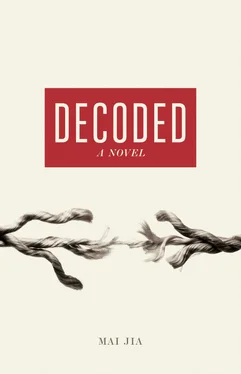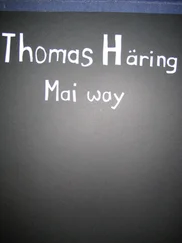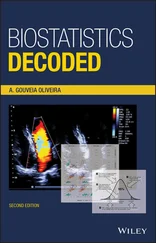Mai Jia - Decoded
Здесь есть возможность читать онлайн «Mai Jia - Decoded» весь текст электронной книги совершенно бесплатно (целиком полную версию без сокращений). В некоторых случаях можно слушать аудио, скачать через торрент в формате fb2 и присутствует краткое содержание. Год выпуска: 2014, Издательство: Allen Lane, Жанр: Современная проза, на английском языке. Описание произведения, (предисловие) а так же отзывы посетителей доступны на портале библиотеки ЛибКат.
- Название:Decoded
- Автор:
- Издательство:Allen Lane
- Жанр:
- Год:2014
- ISBN:нет данных
- Рейтинг книги:3 / 5. Голосов: 1
-
Избранное:Добавить в избранное
- Отзывы:
-
Ваша оценка:
- 60
- 1
- 2
- 3
- 4
- 5
Decoded: краткое содержание, описание и аннотация
Предлагаем к чтению аннотацию, описание, краткое содержание или предисловие (зависит от того, что написал сам автор книги «Decoded»). Если вы не нашли необходимую информацию о книге — напишите в комментариях, мы постараемся отыскать её.
Decoded — читать онлайн бесплатно полную книгу (весь текст) целиком
Ниже представлен текст книги, разбитый по страницам. Система сохранения места последней прочитанной страницы, позволяет с удобством читать онлайн бесплатно книгу «Decoded», без необходимости каждый раз заново искать на чём Вы остановились. Поставьте закладку, и сможете в любой момент перейти на страницу, на которой закончили чтение.
Интервал:
Закладка:
* The world of cryptography has an unwritten rule: an individual can either create ciphers or crack them! This is so because whatever path the person takes, either creating ciphers or deciphering them, that person’s heart and mind have already been given over to their work. However, the world does not allow two similar ciphers to exist.
† I told her that in the end, BLACK was not deciphered by Rong Jinzhen.
8. If you can, could you please tell me exactly what happened to Jinzhen?
9. I suppose what Liseiwicz said was correct.
10. He said, ‘Our lives were ruined by Jinzhen, but in the end he still destroyed himself.’
11. Jinzhen — this kind of person — could perhaps only be destroyed by himself; no one else would be able to accomplish it. Actually, both of them, Liseiwicz and Rong Jinzhen, were cursed by their fates: fate killed them. The only difference was that Jinzhen’s fate was not independent of itself; his fate was tied up with Liseiwicz’s destiny. But from Jinzhen’s perspective, Liseiwicz was simply his gifted teacher and that is all.
12. Let’s talk more again another day. When you come, please bring along the letters Liseiwicz wrote to Jinzhen. I would like to see them.The third time:
1. Yes, Liseiwicz was Weinacht.
2. This much is clear. At the time, he was a member of the Secret Service; how could he use his real name to play the role of a mathematician? A mathematician is someone in the public eye, but the nature of his real work would not allow for that. Besides which, in terms of professional ethics it would not be permitted. What kind of organization would allow you to take a high salary and then just carry on doing your own job?
3. Because he was only an observer on the team developing BLACK, he had the time and energy to engage in other research. In truth, he had always dreamt of working on artificial intelligence and I should say his theory on the binary nature of mathematical constants was of great importance in the development of computer technology. Why did he hope to persuade Jinzhen to leave China? It wasn’t because he was acting at the behest of certain people with certain political aims. No, he hoped that Jinzhen would remain overseas so that the both of them could collaborate on this artificial intelligence project.
4. You will have to think about this problem yourself;* I can give you no answer. In short, Liseiwicz was a scientist: in terms of politics, he was terribly naïve and so it was very easy for him to be wounded; it was also easy for him to be used. As for what you just mentioned — that he was a virulent anti-communist — that is a complete fabrication; I am sure that he harboured no such feelings.
5. Some of the circumstances are clear.† Both of these highlevel ciphers (PURPLE and BLACK) were cracked one after the other. The first, he (Liseiwicz) had created solely by himself, the second he had been a participant in. What is more, the person responsible for deciphering them both was his student. I was there. He did write so many letters — although to look at them they seemed to be an assortment of stratagems aimed at misleading their reader, in truth, who knows whether or not those riddles contained yet more secret information hidden inside them? The probability of deciphering a highly sophisticated cipher is extremely low, and now to see one person crack two of these ciphers in succession and do so incredibly quickly — well, ordinarily that would be impossible. The only way it could have happened was if someone were leaking secrets. But who? The greatest suspicion fell on him, on Liseiwicz. 6. We were put under strict house arrest after it was discovered that BLACK had been broken: that was in the second half of 1970. But even before then, starting around the time when PURPLE was cracked, we were being shadowed whenever we went out. Our telephone was also being monitored, and there were so many restrictions. In truth, it was as though we were under partial house arrest already.
7. In 1979, Liseiwicz passed away due to illness.
8. Ah yes, that was while we were still under house arrest. Every day we were together, every day we had to find things to talk about. That’s how I came to know so much about these things; it was during our period of house arrest that he told me everything. Before that, I knew very little.
9. I’ve been thinking: why has God cursed me with this disease? Perhaps it’s because I know too many secrets. It’s funny really — now that I have no mouth I can talk about these things. Before, when I had a mouth, I couldn’t.
10. I don’t wish to carry these secrets to my grave: I want to die in peace. In my next life I want to be a normal, average person. I don’t want glory, I don’t want secrets, I don’t want friends or enemies.
11. Don’t lie to me, I know how sick I am. The cancer has already spread: I have maybe a few months left.
12. You don’t want to say goodbye to a person about to die, that’s bad luck. Go, I wish you a happy and peaceful life!
* This is a reference to how Liseiwicz later became involved in extremist politics. † This is a reference to the circumstances which resulted in X country putting Liseiwicz and his wife under house arrest.
A few months later, I heard that she underwent open skull surgery and a few months after that I heard that she had died. Supposedly, in her last will and testament she mentioned me — hoped that I wouldn’t use their real names in the book I was writing; she and her husband wanted to rest in peace. In this book, the names Fan Lili and Liseiwicz are aliases. Even though this goes against the criteria I had set for writing — really, what could I do? An old person, whose fate had been full of frustrations and dashed hopes, who had loved so deeply and passionately, whose last will and testament spoke of a desire to be left in peace — because their life had been so difficult, how could I not respect their wishes!
5
I should talk about Yan Shi.
It was perhaps true that Yan Shi had initially attempted to push Rong Jinzhen to one side; he had deliberately tried to create estrangement between himself and everyone else in Unit 701. After his retirement, he no longer lived within the confines of the unit; instead, he had moved with his daughter to the capital of G province. The high-speed expressway had made the distance between there and A City quite short, and so I arrived in the provincial capital just three hours after leaving Unit 701. Even better, I had little difficulty in locating the daughter’s home and thus seeing Yan Shi.
He was as I imagined him. Sporting a pair of thick-lensed nearsighted spectacles, he was already well over seventy; indeed, much closer to eighty. His hair was luminous silver and his eyes carried deceit and secrets within them. In short, he was completely devoid of the benevolence and grace expected of old men. As my visit was rushed, I had come upon him seated in front of a Go table; his right hand was deftly manoeuvring a set of resplendent meditation balls while his left grasped a white Go stone; he was deep in thought. But there was no opponent seated opposite him — he was playing against himself. Yes, playing against himself — like speaking to one’s self; like some tragic and lonely old fool still holding onto great aspirations. His granddaughter, a fifteen-year-old high-school student, told me that since his retirement it was hard to pry him away from the game. Every day he whiled away the hours either playing Go or reading books on it. He had become quite skilled at it, so much so that it was now hard for him to find an opponent. All he could do was rely upon his Go books to satisfy his addiction.
Haven’t you heard? Playing chess against one’s self is actually like playing against a famous exponent.
Читать дальшеИнтервал:
Закладка:
Похожие книги на «Decoded»
Представляем Вашему вниманию похожие книги на «Decoded» списком для выбора. Мы отобрали схожую по названию и смыслу литературу в надежде предоставить читателям больше вариантов отыскать новые, интересные, ещё непрочитанные произведения.
Обсуждение, отзывы о книге «Decoded» и просто собственные мнения читателей. Оставьте ваши комментарии, напишите, что Вы думаете о произведении, его смысле или главных героях. Укажите что конкретно понравилось, а что нет, и почему Вы так считаете.












